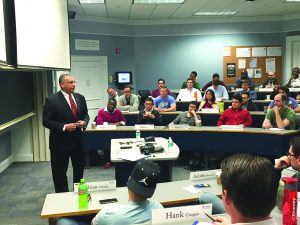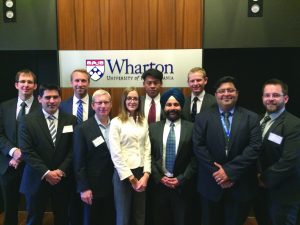The Equipment Leasing and Finance Association (ELFA) was established to provide its members with a forum for industry development, a platform to advocate for the industry and a resource for industry information. So when ELFA leadership started noticing more gray hair among its members, it made sense for the association to lead the charge in finding ways to attract new and younger talent.
Through the Guest Lecture Program, member company leaders are encouraged to build relationships with educational institutions by hosting an on-site industry overview presentation. The Emerging Talent Council (ETAC) attempts to tie up-and-coming talent at member companies into the association and the industry via events and networking.
Both are rather recent developments, with the Guest Lecture Program taking shape in 2012 — and the first lecture taking place in 2013 — and the ETAC’s first meeting at ELFA’s Capitol Connections in Washington, D.C. in 2014. Several years on, ELFA leadership and members who have participated in the programs provided their assessment of the initiatives so far.
Is the Industry Really “Graying?”
The notion that the equipment finance industry is “graying” seems to be mostly anecdotal, but ELFA President and CEO Ralph Petta says working to attract younger talent and creating awareness is a core component of the ELFA’s mission.
“As long as I’ve been here, you hear about the graying of the industry and the balding of the industry. The Guest Lecture Program and the Emerging Talent Advisory Council offer a way to get younger people involved in not only the industry, but the association, to learn more about what we do and about opportunities within the industry,” Petta says.
Former ELFA board member, current Equipment Leasing and Finance Foundation (ELFF) Vice Chairman and Guest Lecture Program participant Scott Thacker, who serves as CEO of Ivory Consulting, acknowledges there is a graying taking place, because those who were part of the industry when it took off in the 1970s are now approaching retirement age. The retirement of the baby boomers is arguably one of the most significant phenomena facing the U.S. over the next few years, although he has yet to see any statistics that indicate the equipment finance industry is facing retirement faster than any other industry. In other words, it’s simply time to welcome the next generation of equipment finance professionals — the millennials — into the fold.
Emerging Talent Advisory Council member and Vice President at First American Equipment Finance Nathan Gibbons says 10 years in the industry hasn’t been long enough to see a significant change in age or experience, but he offers another reason the industry might give the appearance of graying: low personnel turnover.
“Many have said that once you’re in the industry, you never leave,” he says. “It is rather indicative of the endless opportunities that people can find at their disposal within this industry.”

Laying the Foundations
While the notion that the equipment finance industry is graying is far from scientific, the association’s membership devised several programs to further the practice of attracting and developing millennials.
In 2012, members of the ELFA’s Financial Institutions Business Council Steering Committee noted a need for a resource that members could use to educate others about the industry. At that point, the Guest Lecture Program was designed so that members could visit academic institutions in their networks and make presentations about what the equipment leasing and finance industry is, how it works and why it’s important for businesses and municipalities.
“They essentially struck on this concept…we’ll develop a PowerPoint presentation with a standard slide deck and invite members to present it to students at their alma mater or at colleges and universities in their area,” Petta says. According to Petta, ELFA members have presented at institutions including Stanford University, the University of Virgina, the University of Rochester and The Wharton School.
This momentum led to the creation of the ETAC, a dedicated focus group within the ELFA tasked with assessing how the association could reach and serve more industry employees in the early stages of their careers.
In the Field
Thacker felt being an effective board member meant participating in programs like the Guest Lecture Program. Being on the West Coast and an alumnus of the University of Pennsylvania’s Wharton School, Thacker contacted the dean of the school’s campus in San Francisco.
Thacker learned that the MBA program there hosted a guest lecturer every Friday, so he reached out to three Bay Area ELFA colleagues to help present his first guest lecture.
Wharton’s San Francisco campus teaches executive MBA students, so the audience was older than the typical MBA cohort, which gave the presentation a different flair. Thacker and his colleagues also tailored their presentation to emphasize entrepreneurialism and technology, given that they were in one of the tech capitals of the world.
“Some of the people in our session had previously worked in finance and were familiar with equipment leasing, so their questions were insightful,” Thacker says. “Because we tailored the presentation to the audience, the discussion was engaging, and it was clear that the students saw that they could find a role in our industry. Apparently our message was well received — a few months ago the vice dean called and asked us to deliver the program again in 2017.”
In the fall of 2014, Gibbons and a handful of other Emerging Talent Advisory Council members formed a subcommittee to learn more about the Guest Lecture Program and how it might be enhanced. They quickly came to the conclusion that the best way to do this was by giving lectures themselves.
Gibbons’ first lecture was at Roberts Wesleyan College in the summer of 2015, and he’s since done several lectures, including at the University of Rochester, where he received his MBA. As in Thacker’s case, Gibbons tailored the prepared slide deck and presentation to reflect his own experiences.
“I found that students tend to be more engaged when they have a personal connection. I always try to start by talking about myself, and I don’t mean my title or my professional achievements. I talk about my wife and my sons and my siblings and a few hobbies, and then I talk about how I stumbled upon the industry and why I stayed,” Gibbons says. “I give some fun facts about the industry and the new types of equipment and projects we finance and how influential our industry can be. Hopefully if I’ve done a good job, at least a few students will have some intrigue about the industry from a career perspective.”

Does It Work?
Given that the ELFA is only a few years into the project, Petta is cautious in his assessment of the programs.
“It’s kind of early to measure tangible results, but if the enthusiasm and the interest level is any indication, I think we really have a winner on our hands,” Petta says. “So now it’s just a matter of expanding the program.”
Petta notes that starting in 2017, the ELFF, ELFA’s research affiliate, will oversee the Guest Lecture Program, drawing on its existing connection with the academic community to grow the program.
Gibbons also doesn’t base the program’s effectiveness on subsequent resume submissions; he finds value in how the program creates a relationship between students, educators and the industry.
“Students are getting what their degree should afford them and that is more career options. Professors are enhancing the classroom experience by having a live speaker from the business community,” Gibbons says. “And while I don’t personally deliver the lectures as a recruiting strategy, the level of interest and awareness of the industry from college students has increased significantly.”
That said, Gibbons acknowledges there are several “extremely high caliber” people working for First American who might not have known about the industry had it not been for the Guest Lecture Program.
The Guest Lecture Program has also facilitated discussions inside the ELFA. With no dedicated equipment finance major in colleges and most professionals seemingly having “stumbled upon the industry,” Gibbons says members wanted to start taking a more proactive approach towards attracting talent.
Why They Do It
Petta acknowledges that while not everyone in the audience during a lecture will seek a career in equipment finance, the experience can still be mutually beneficial.
“In addition to the awareness, the other part of this is a lot of these students are going to be customers someday,” he says. “A lot of these students are going to be working for businesses and organizations that are going to want to acquire assets in some form or fashion and so this is a great way to reach a bunch of potential decision makers who are now in either an MBA phase of their lives or they’re either seniors or juniors in undergraduate programs.”
For Thacker, who serves as a vice chairman for the ELFF, the Guest Lecture Program reflects part of his role as a senior industry veteran and company leader.
“My most important role as a CEO of a service provider and now a Foundation trustee and former ELFA board member is to help develop other people with the hope that they will find the same success that I’ve been fortunate enough to have experienced,” Thacker says. “Reflecting back on my days at Wharton, many of the most memorable lessons came from the guest lecturers that presented each week. To me, it’s not even a question that I should want to do this.”
And for Gibbons, it’s a matter of personal responsibility as much as it is one of industry enhancement.
“When I think back to when I graduated and how unprepared I was from a job search perspective, it doesn’t take long for me to appreciate just how fortunate I was to have found myself working for such a great organization and such a remarkable industry and essentially doing it on my first try,” he says. “I know my story is not the norm. I haven’t been able to shake the sense of responsibility to try and give back due to all of the opportunities that have been given to me.”